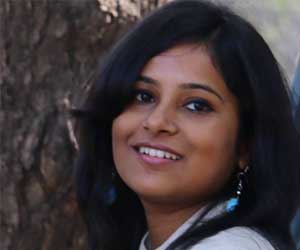In 1987, the United Nations Brundtland Commission defined sustainability as “meeting the needs of the present without compromising the ability of future generations to meet their own needs.” Promoting this aspect and environmental conservation, an Eco Park Information Centre (EPIC) has been created in an area of less than half an acre, about 20 kilometers away from Chennai, in the state of Tamil Nadu by Ms. Shantha Sheela Nair, a retired IAS Officer. The Eco Park can be described to be a world in itself as it consists of Miyawaki forest, rainwater harvesting structure, eco-sanitation toilet system, a nutritional garden, a biogas plant, a herbal garden, and birds, bees and flowers of every kind. In fact, the nutritional garden consists of millets, pulses, and vegetables which are all organically grown. Additionally, the park is also home to ornamental fish breeding. The interesting part is that the park cum information center just does not harbour these facilities but activities such as mushroom cultivation; organic farming, ornamental fish breeding etc are promoted as skills which can be imparted to the people. Ms. Nair has also focussed on alternate energy mechanisms by focusing on solar cookers, solar yard lightings in the park, solar dryers to dry fruits, vegetables and crops for preservation and solar panel power production for water pumping and processing of farm products. The park is the best example of a place which generates free fuel from biogas which in turn is produced from farm waste and toilet septic tanks. The park has created an environment where moths, butterflies, and insects thrive. This eco information center has been designed in such a way that it promotes dry toilets with a focus on water optimization.
A multi-dimensional ecological park, it also serves as a training center where local farmers as well as those from far off places such as Nagaland and Kashmir come to learn organic farming. Additionally, women from the nearby villages come to learn make bamboo planters, bamboo lamps, and other artifacts. Another feature which makes the park to stand out is that one of the buildings has been constructed by using laterite interlocking blocksnot requiring cement and steel, highlighting a traditional alternative and sustainable architecture style for building construction. Recently, in order to further promote sustainable livelihoods within communities, an EPIC Fellowship Programme has been launched. The Fellowship Program are for students who can study and document several aspects of sustainable practices and biodiversity preservation.
The formulation of this ecological park cum information center was not a one-time master plan; rather it was a step by step process which developed as it went along. According to the main architect of this park Ms. Nair, the Eco Park did not start with the idea or a concept of a park. It was a family property land which was lying there for a long time and was totally unused. After trying to give other people to make use of the land, Ms. Nair took it upon herself to make use of the land. The first task was to find water on the land after which came the plantation of the Miyawaki forest, nutritional garden, roof water harvesting, eco-sanitation toilets etc. Hence, within a year’s time, the Park saw a footfall of almost 3000 people. The main purpose of this initiative is to promote sustainable agriculture, sustainable livelihood, and sustainable lifestyles.
Ms. Nair has been a promoter of water conservation and preservation throughout her service. This reflects in the ecological park cum information center as well where a lot of emphasis has been given on rainwater harvesting and roof water harvesting structures as well as eco-sanitation toilets, and unnecessary consumption of fine grains. As per her it is important to diversify our food basket. The Park is a clear indication of her beliefs that India has focused too much on the supply side management of water instead of the demand side. At present, it is important to bring down and optimize water use. The Eco Park is also a manifestation of an awareness creation campaign. Ms. Nair firmly believes that to create awareness amongst people about the environment and its resources is for the people to visit the park and experience things around them which leads to an interactive mode. This exercise not only creates awareness but also leaves a long-lasting impression. Hence, the Eco-Park is known as a “Information Centre” as people get information through a first-hand experience.
Ms. Nair is a firm believer and an advocate of “decentralized system” of management of resources. Involvement of people and communities in terms of taking the ownership of the resources which comes under their vicinity will contribute to sustainability. A de-centralized system of management encourages people to be more self-dependent and leads to empowerment.
A lot of inspiration can be drawn from the Eco-Park Information Centre for the rest of the country. Firstly, it is not just an Eco Park but also an information centre, an idea unique in its self. Secondly, it demonstrates the conservation and preservation of water in the form of rain water as well as roof water harvesting system. It takes you back to India’s traditional form of food habits which mainly included millets. It promotes the idea of “de-centralized system” of resources. It is a sustainable world in itself and the country needs more of such information centers especially in urban spaces.
(The paper is the author’s individual scholastic articulation. The author certifies that the article/paper is original in content, unpublished and it has not been submitted for publication/web upload elsewhere, and that the facts and figures quoted are duly referenced, as needed, and are believed to be correct). (The paper does not necessarily represent the organisational stance... More >>
Image Source: https://adyartimes.in/wp-content/uploads/2023/09/21-epic.jpg










Post new comment